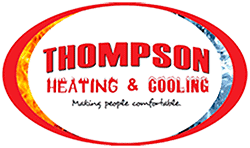Maintaining a comfortable home is about efficient heating and cooling and ensuring a healthy indoor environment. Indoor air quality (IAQ) is crucial to your family’s well-being, as poor IAQ can lead to allergies, respiratory issues, and other health concerns.
Since 2003, Thompson Heating & Cooling has been dedicated to providing whole-home comfort services to residents of La Grange, Louisville, and the surrounding areas, utilizing top-quality products from leading manufacturers like Ruud, Mitsubishi, ClimateMaster, and Nest to address all aspects of your home’s indoor environment, including air quality.
Indoor air pollution can stem from various sources, such as allergens, volatile organic compounds (VOCs), bacteria, and mold. As a result, an effective indoor air quality strategy must tackle these pollutants with tailored solutions designed for each home’s specific needs.
Trust Thompson Heating & Cooling to provide expert guidance, quality products, and professional installation services, ensuring optimal indoor air quality and overall home comfort tailored to your unique needs and lifestyle.
Common Indoor Air Pollutants
Various pollutants can affect your home’s indoor air quality and pose health risks. Some common pollutants include:
- Allergens: Airborne allergens, such as pet dander, pollen, and dust mites, can trigger allergic reactions and respiratory issues.
- Volatile Organic Compounds (VOCs): These compounds are emitted from everyday household materials and products like paint, cleaning supplies, and furniture. Exposure to high levels of VOCs can lead to headaches, respiratory issues, and other health concerns.
- Mold and Mildew: Excess moisture in your home can contribute to mold and mildew growth, producing allergens and irritants that affect air quality and trigger respiratory symptoms.
- Bacteria and Viruses: Poor ventilation and improper humidity management can create an environment conducive to the spread of airborne bacteria and viruses, potentially leading to illness in your household.
Assessing Your Home’s Indoor Air Quality
Before implementing indoor air quality solutions, assessing your home’s current air quality is crucial. Here are some techniques to evaluate your home’s IAQ:
- Visual and Olfactory Inspection: Look for noticeable issues like mold, mildew, or excessive dust, and pay attention to unusual odors that may indicate poor air quality.
- IAQ Testing Kits: These kits can measure pollutant levels such as VOC concentrations, mold spores, and allergens, providing a snapshot of your home’s indoor air quality.
- Professional IAQ Assessments: A thorough examination by a qualified HVAC professional can comprehensively evaluate your home’s air quality, identifying underlying issues and recommending tailored solutions.
Indoor Air Quality Solutions
Several solutions are available to improve your home’s air quality:
- Air Filtration and Purification: High-quality air filters, air purifiers, or a combination of both can capture and remove contaminants like allergens, mold spores, and bacteria from your indoor environment. Options include media air filters, HEPA filters, and UV germicidal lights.
- Humidity Control: Maintaining your home’s humidity levels between 30-50% can help reduce mold and mildew growth and minimize the spread of viruses and bacteria. Dehumidifiers and humidifiers can help manage these levels, contributing to improved indoor air quality.
- Ventilation Enhancements: Proper airflow and ventilation can contribute to a healthier indoor environment by removing stagnant air and circulating fresh outdoor air. Options like energy recovery ventilators (ERVs) or mechanical ventilators can maintain a balance of fresh air and energy efficiency.
- Regular HVAC Maintenance: Keeping your heating and cooling system clean and well-maintained can help reduce the spread of pollutants through your home’s air ducts.
Tips for Maintaining Good Indoor Air Quality
Implementing these everyday habits and strategies can contribute to a cleaner and healthier home environment:
- Keep Your Home Clean: Regular cleaning, dusting, and vacuuming can control allergens, dust, and pollutants.
- Adjust Your Cleaning Routine: Switch to low-VOC cleaning products and methods that reduce the introduction of additional pollutants into your home.
- Maintain Healthy Humidity Levels: Use exhaust fans in kitchens and bathrooms, fix plumbing leaks, and use proper ventilation to reduce excess moisture.
- Use Natural Air Fresheners: Opt for natural ways to freshen the air, such as opening windows, using an air purifier, or incorporating houseplants that help filter the air.
- Place Door Mats: Having door mats at all entrances can help reduce the number of pollutants and allergens tracked into your home.
Conclusion
Investing in indoor air quality solutions is essential for maintaining a healthy, comfortable living environment. Understanding common pollutants, assessing your home’s air quality, implementing effective solutions, and adopting proper habits can increase your home’s overall comfort and well-being. Trust Thompson Heating & Cooling to provide expert guidance, top-quality products, professional installation, and comprehensive HVAC services in Louisville, KY, to ensure your home’s indoor air quality meets your family’s needs and preferences.


